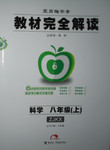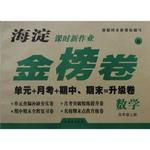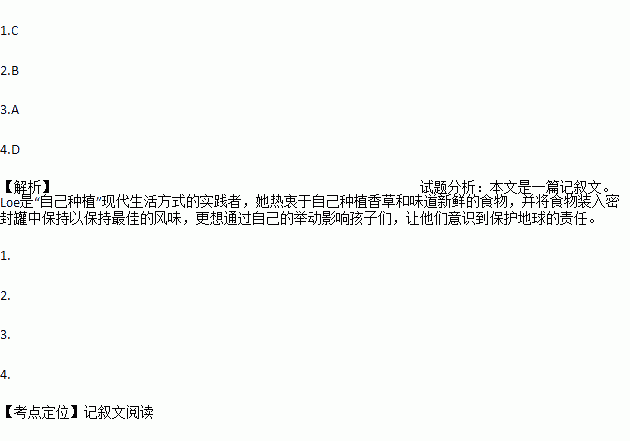题目内容
What Theresa Loe is doing proves that a large farm isn’t a prerequisite for a modern grow-your-own lifestyle. On a mere 1/10 of an acre in Los Angeles, Loe and her family grow, can(装罐)and preserve much of the food they consume.
Loe is a master food preserver, gardener and canning expert. She also operates a website, where she shares her tips and recipes, with the goal of demonstrating that everyone has the ability to control what’s on their plate.
Loe initially went to school to become an engineer, but she quickly learned that her enthusiasm was mainly about growing and preparing her own food. “I got into cooking my own food and started growing my own herbs (香草) and foods for that fresh flavor,” she said. Engineer by day, Loe learned cooking at night school. She ultimately purchased a small piece of land with her husband and began growing their own foods.
“I teach people how to live farm-fresh without a farm,” Loe said. Through her website Loe emphasizes that “anybody can do this anywhere.” Got an apartment with a balcony (阳台)? Plant some herbs. A window? Perfect spot for growing. Start with herbs, she recommends, because “they’re very forgiving.” Just a little of the herbs “can take your regular cooking to a whole new level,” she added. “I think it’s a great place to start.” “Then? Try growing something from a seed, she said, like a tomato or some tea.”
Canning is a natural extension of the planting she does. With every planted food. Loe noted, there’s a moment when it’s bursting with its absolute peak flavor. “I try and keep it in a time capsule in a canning jar,” Loe said. “Canning for me is about knowing what’s in your food, knowing where it comes from.”
In addition to being more in touch with the food she’s eating, another joy comes from passing this knowledge and this desire for good food to her children: “Influencing them and telling them your opinion on not only being careful what we eat but understanding the bigger picture,” she said, “that if we don’t take care of the earth, no one will.”
1.The underlined word “prerequisite” (Pare. 1) is closest in meaning to “______”.
A. recipe B. substitute
C. requirement D. challenge
2.Why does Loe suggest starting with herbs?
A. They are used daily.
B. They are easy to grow.
C. They can grow very tall
D. They can be eaten uncooked
3.According to Loe, what is the benefit of canning her planted foods?
A. It can preserve their best flavor
B. It can promote her online sales
C. It can better her cooking skills
D. It can improve their nutrition
4.What is the “the bigger picture” (Para. 6) that Loe wishes her children to understand?
A. The knowledge about good food
B. The way to live a grow-our-own life
C. The joy of getting in touch with foods
D. The responsibility to protect our earth
 王后雄学案教材完全解读系列答案
王后雄学案教材完全解读系列答案 海淀课时新作业金榜卷系列答案
海淀课时新作业金榜卷系列答案
